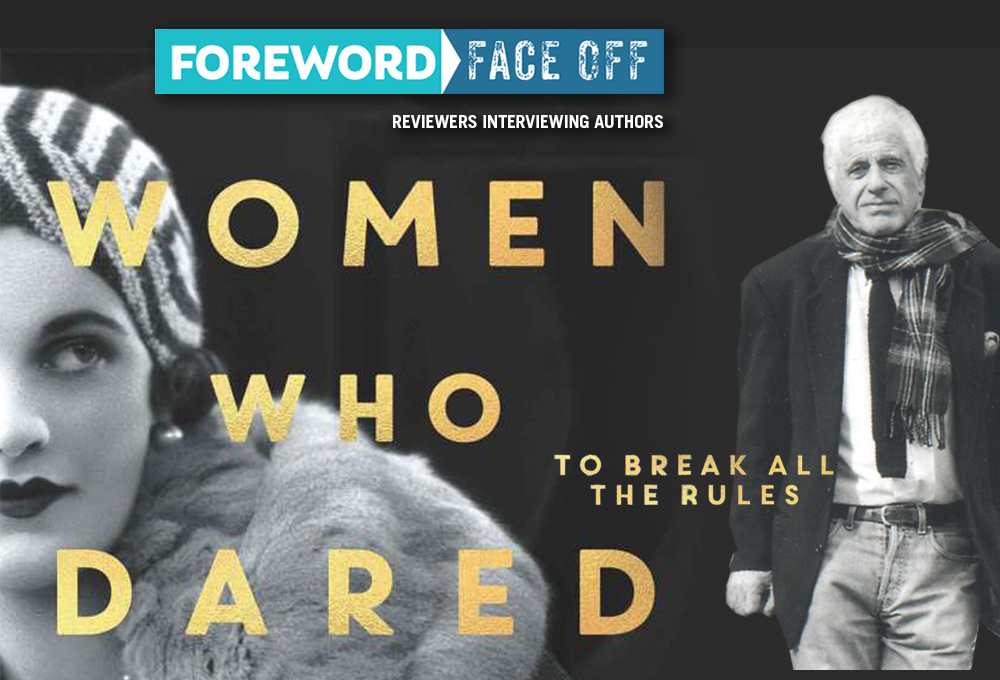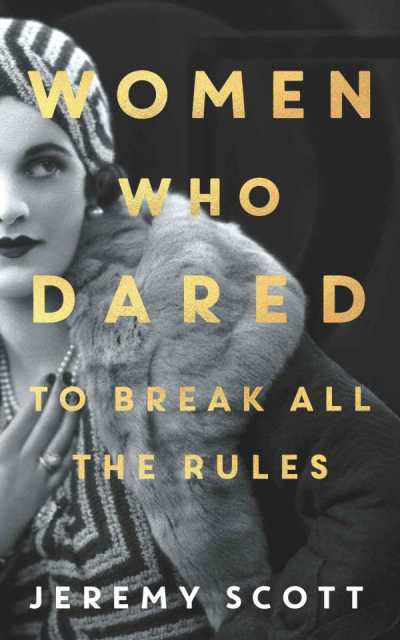Reviewer Kristine Morris Interviews Jeremy Scott, Author of Women Who Dared: To Break All the Rules

The ironic fact that so many powerful and successful contemporary women refuse to identify as feminists—the same feminist movement that did so much to help these women achieve their empowered status in the first place—points to something exciting: it’s never been a better time to be born female. Yes, there’s still great injustice, but for girls and women virtually every place you look on the planet is kinder, the opportunities grander, the pay fairer, and the future brighter. We should all be proud of the progress (well, except for the millions of men fighting tooth and nail to maintain the bad ol’ days).

This week’s interview hearkens back to a time when bold, defiant, sexually adventurous women were scorned as “sexual delinquents,” and sometimes locked away in asylums where they were subjected to genital mutilation. But the six women Jeremy Scott profiles in Women Who Dared: To Break All the Rules refused to stand down. They “rejoiced” in their boldness, he writes, and their unbridled sexual energy “was a defiant assertion of self and of independence, just as it has always been for accomplished men.”
With the help of One World Publishing, we put Jeremy in touch with Kristine Morris, one of our most senior reviewers, for a conversation about the personalities in Women Who Dared. Kristine granted the book a starred review in the March/April issue of Foreword Reviews, and she jumped at the chance to ask Jeremy how women like Victoria Woodhull and Mary Wollstonecraft were able to soar so majestically in a society dominated by insecure men who tormented women for sport. You might be surprised by his answer.
Enjoy the interview.
Women Who Dared features some audacious women, and I can’t help feeling that you are on their side, cheering them on. Why did you select these particular women?
I was, and am, openmouthed in awe at their courage, chutzpah, and self-belief. Also, by the charisma they all share that resembles an almost supernatural force which enables its owner to pull off actions others cannot. This is the linked bloodline these women have in common. What is charisma? What composes it? I strive to analyze it.
These women didn’t wait for society, the church, or their husbands to give them permission to act, but took action when action was called for. In what sense might you see them as role models for today’s women? In what way might they be warnings?
These women are superb role models for today, they are an inspiration. To proclaim and act on your beliefs so defiantly makes powerful enemies who will seek to discredit and destroy you. Men have always feared strong women. Simone de Beauvoir hit the nail on the head when she said “No one is more arrogant toward women, more aggressive or scornful, than the man who is anxious about his virility. Men do not like tomboys, nor bluestockings, nor thinking women; too much audacity, culture, intelligence, or character frightens them.”
Why did “free love,” sexual improprieties, affairs, and scandals figure so prominently in their lives? Might it have been, in part, political—an expression of what they saw as their right to control their own bodies and engage in sexual relationships with the same freedom that men enjoyed?
It certainly was political. It was a defiant assertion of self and of independence. They rejoiced in their boldness. High sexual energy fuels the lives and careers of many successful women and men. Again, men fear this in women. They called it “nymphomania,” and categorized it as a disease through most of the nineteenth century. Treatment included diet, exercise, and ice compresses applied to the genitals. If ineffective, a surgeon was called in to remove the patient’s clitoris and cauterize her labia with a red-hot instrument. Early in the twentieth century, the condition was reclassified as “moral delinquency.” “Delinquent,” “wayward,” or “sexually psychopathic” girls were brought to court on charges of “disorderly conduct,” or institutionalized as “incorrigible.” By the 1920s, at the time of Edwina Mountbatten’s youth, it was a psychosexual disorder, later identified as the “Messalina Complex.” You will not have failed to note that every one of these diagnoses, categories, and labels were devised by males. Meanwhile the equivalent condition in men continued to be admired and was later rated an alpha male characteristic. Now the word, “nymphomania” has fallen into disuse, and soon “sex addict” will, too. The concept is held by many not to exist, being seen instead as a lifestyle choice to live boldly in a manner that’s only possible in the West today.
Do you think their sexual exploits helped or hindered the causes they worked for?
Undoubtedly, it helped. As Sam Goldwyn said, “All publicity is good publicity.” Notoriety and infamy put you, and your cause, on the map.
Why has so little attention been given to the accomplishments of outstanding women throughout history? Why do patriarchal institutions, governments, religions, and corporations still fight full equality for women, especially women of color, and what do you think can be done about it?
It was men who wrote history; men authored its narrative. This book, and many others, seeks to reclaim that narrative. In the West, the war is already won. What remains is what the military would call “clearing up operations.” What can be done? Defy, take risks, challenge that authority. History is now on your side.
What do you think the women featured in your book might have to say about the status of women in the developed world in the twenty-first century?
I think they’d say, “Right on, sister!” “Sock it to them!” “Go girl, go!”
What do you see as the greatest obstacle that’s still holding women back from full participation in government, religion, and other social institutions, and what do you think it would it take for full equality to prevail?
The greatest obstacle is ingrained male prejudice. Use wit and humor to identify and ridicule this; earnestness is too blunt a weapon. Institutions are armed to resist attack, but ridicule undermines them.
If you could go back in time and have a good, long conversation with any one of these women, which one would you choose, and why?
I’d choose Victoria Woodhull—such mesmerizing charisma. Plus charm, beauty, grace, blithe courage. I think I would have fallen in love with her at first encounter, as so many did. She is a true American hero, and largely unknown.
Let’s move you a hundred years into the future to write another book like Women Who Dared. Which of today’s women might you feature, and why?
I think it’s too soon to say. Who could effect an historic change like Chanel’s creation of the “New Woman” in the twenties? Or articulate the first rational manifesto as did Mary Wollstonecraft? What Wollstonecraft accomplished was historic, writing the gospel for her gender. She articulated what before had been an inchoate female consciousness, and issued the first women’s manifesto, whose demands have yet to be fully satisfied. And Victoria Woodhull, who didn’t succeed in becoming president of the United States, but had she done so, she and her irrepressible sister Tennie would surely have made a joyous spectacle of their governance.
Prior to Aimee Semple McPherson, God was exclusively men’s business. Then she stepped up onto a chair in Main Street America to say, “Follow me!” And they did, in the thousands, to form a worldwide church. In the creation of the modern world in the 1920s, she understood new media before media understood itself; she set the pace. Edwina Mountbatten’s epiphany during the Blitz of London took her out of a selfish existence to save or succor millions of men, women, and children. She devoted herself to caring for the most undesirable people on earth—homeless refugees. In her boldness and quasi-royal authority, it is even possible she believed the problem soluble.
And Margaret Argyll was what she was at a seminal moment, cuing the tone for the sixties, setting a bonfire that torched traditions by exposure and ridicule, and replacing them with a cynicism beyond skepticism—the obtaining climate of today. And Coco? She scripted her own copy: “The most courageous act is still to think for yourself. Aloud.” And, “Sin can be forgiven, but stupid is forever.” And, “A girl should be two things: who, and what, she wants. You can be gorgeous at thirty, charming at forty, and irresistible for the rest of your life.”
Kristine Morris
